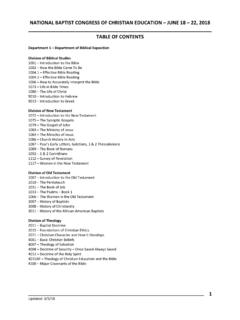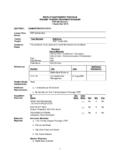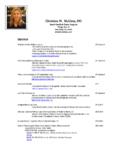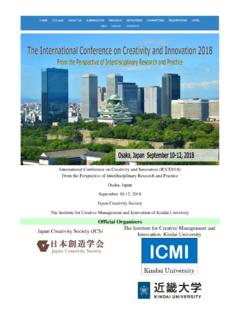Transcription of SYLLABUS MASTER OF EDUCATION (M.Ed.) (2-year …
1 SYLLABUS . MASTER OF EDUCATION ( ). (2-year Programme). FOR 2015-17 EXAMINATIONS. OUTLINES FOR evaluation . Each paper carries 100 marks including external as well as internal evaluation . The duration of the examination will be three hours. Semester - I. Theory 16 credits 1. Philosophy of EDUCATION 4 credits 2. Psychology of Learning and Development 4 credits 3. Educational Studies 4 credits 4. Introduction to Educational Research 4 credits Practicum-cum-Field Work 5 credits i. Selection of Research Problem & Preparation of Dissertation Research 2 credits ii. Field Work: Visit to schools (elementary/secondary/senior secondary) and 3 credits TEIs (DIET/Colleges of EDUCATION ).
2 Semester II. Theory 16 credits 5. History and Political Economy of EDUCATION 4 credits 6. Sociology of EDUCATION 4 credits 7. Curriculum Studies 4 credits 8. Teacher EDUCATION : History and Policy Perspective 4 credits Practicum-cum-Field Work 6 credits i. Data Collection: Tools and Sample (Descriptive & Experimental Research) 2 credits OR. Sources of Data (Historical & Philosophical Research). ii. Data Processing using SPSS/Excel and any other software package. 2 credits iii Field Engagement 2 credits 1 Semester - III. Theory 16 credits 9. Educational Research Methods and Statistics 4 credits 10.
3 Professional Development of Teachers at Elementary School 4 credits Stage/Secondary School Stage 11. Specialization (Opting for one paper with Elementary EDUCATION or 4 credits Secondary EDUCATION as Specialization). i) Comparative EDUCATION ii) Educational Administration and Planning 12. Optional Paper (any one) 4 credits i) Guidance and Counseling ii) Gender, EDUCATION and Development iii) EDUCATION , Democracy and Human Rights iv) Literacy and Life-long EDUCATION v) EDUCATION of Socially Disadvantaged Groups vi) Measurement and evaluation Practicum-cum-Field Work 5 credits i.
4 Tool Development 2 credits - Programme evaluation - Institutional evaluation ii. Curriculum Review 2 credits - School EDUCATION (Subject-wise). - Teacher EDUCATION iii Field Engagement 1 credit Semester - IV. 13 to 15 Specialization (Opting for three papers with Elementary EDUCATION 12 credits or Secondary EDUCATION as Specialization). i) Economics of EDUCATION ii) Educational Policy and Research iii) Educational Technology iv) Life Skills EDUCATION v) Inclusive EDUCATION 16. Dissertation 4 credits Practicum-cum-Field Work 4 credits Academic Work: Seminar, Workshop Reporting, Writing research articles/papers Theory Based examination 15 Theory Papers + Dissertation 16 X 4 Credits = 64 Credits Practicum-cum-Field Work (elementary/secondary schools 20 Credits and teacher EDUCATION institution).
5 Grand Total 84 Credits Note: i) A student will choose elementary school stage (a) or secondary school stage (b) courses from 11 to 15 (all five courses will be either for elementary or secondary school stage). ii) The practical-cum-field work including three main experience based activities school based, teacher EDUCATION based and research work leading to dissertation is to be conducted and evaluated during all the four semester in a comprehensive and continuous manner, a detailed outline of the same will be available by mid-July 2015 before the commencement of academic session.
6 2 SEMESTER - I. PAPER-1: Philosophy of EDUCATION (A) Objectives On completion of this course the students will be able to: a) Understand the philosophical foundations of EDUCATION . b) Acquaint him/her with different schools of thoughts on EDUCATION and draw generalizations. c) Understand the theories and ideas of different educational thinkers. d) Understand the theoretical basis of present day educational system. (B) SYLLABUS SECTION A. (i) Philosophy of EDUCATION : Nature, Scope and Functions (ii) EDUCATION and Metaphysics: Metaphysical problems confronting educationists related to the nature of the world and nature of man.
7 (iii) Epistemology and EDUCATION : Types of Knowledge, Methods of acquiring knowledge with special reference to logical analysis, positive relativism and logical empiricism. (iv) Axiology and EDUCATION : Meaning, classification and hierarchy of values, Role of EDUCATION in inculcation of values. SECTION B. (v) Western Schools of Philosophy (Idealism, Naturalism, Pragmatism, Existentialism, Marxism) with special reference to the concepts of reality, knowledge and values, their educational implications for aims, contents and methods of EDUCATION . (vi) Indian Schools of Philosophy (Sankhya, Vedanta, Buddhism, Islamic traditions, Sikhism) with special reference to the concepts of reality, knowledge and values, their educational implications for aims, contents and methods of EDUCATION .
8 Sessional Work (Any one of activities). i). Case study of a school/college/university philosophical aspects of learning. ii). Critical appraisal of a thinker/book in terms of philosophy of life, values and ethics. iii). Observations of a group of community members on socio-political conditions of country in a group discussion or critical review of a newspaper article on a current social issue of concern on girl child/women and marginalized section of society. 3 (C) Books Recommended 1. Ansari, (2003). Philosophical Foundations of EDUCATION . New Delhi: Sanjay Prakashan.
9 2. Black, N. et al. (2003). Philosophy of EDUCATION . UK: Blackwell Publishers. 3. Broudy, (1955). Building a Philosophy of EDUCATION , New Delhi : Prentice Hall of India. 4. Brubacher, Modern Philosophies in EDUCATION . 5. Chaube, (2007). Foundations of EDUCATION , New Delhi: Vikas Publishing House. 6. Dewey, J (1916/1966). Democracy and EDUCATION . An Introduction to the Philosophy of EDUCATION , New York: Free Press. 7. Gnanakan, Ken (2011). Integrated Learning, New Delhi: Oxford University Press. 8. Gupta, S., & Singh, A. (Eds.). (2008). Value based EDUCATION : Dimensions and directions.
10 Mandi Gobindgarh, Punjab: Desh Bhagat Group of Institutions. 9. Kabir, H. (1962). Indian Philosophy of EDUCATION , New Delhi: Asia Publishing House. 10. Pathak, Avijit (2004). Social Implications of Schooling: Knowledge, Pedagogy and Consciousness. Noida: Rainbow Publishers. 11. Pathak, (2012). Philosophical and Sociological Principles of EDUCATION , New Delhi: Pearson. 12. Pring, R (2004). Philosophy of EDUCATION Aims, Theory, Common Sense and Research, New York: Continuum. 13. Rajput, (2006). Human Values and EDUCATION . New Delhi: Pragun Publications. 14. Ross, James (1966).



